Catalan Playing Cards
With a distinct history stretching back to the early middle ages, many Catalans think of themselves as a separate nation from the rest of Spain.
The Modern Spanish Catalan pattern
With about 16% of the Spanish population and a distinct language and culture of its own, Catalonia is one of Spain’s richest and most independent-minded regions. What is known today as the “Modern Spanish Catalan” playing card pattern (to avoid confusion with the French Catalan style) began to emerge with an identity of its own during the early 19th century and became fully developed by the end of the 19th century. It was primarily manufactured by makers in the Barcelona region (Bertschinger, Sebastian Comas y Ricart, Wenceslao Guarro, Giráldez, Juan Roura, etc) but is now regarded as a standard pattern throughout Spain and beyond. Packs usually contain 40 or 48 cards.

Above: Catalan pattern produced by Sarbat y Solé, Barcelona, 1847. Stencil-coloured woodcuts. © The Trustees of the British Museum • Sarbat y Solé, Barcelona, 1847►
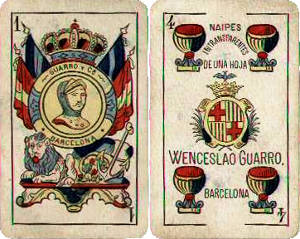
The design was exported to many South American countries (in particular Argentina, Brazil and Uruguay) and is also produced today as far afield as India and China.
See also: Baraja Marca “Tití”→
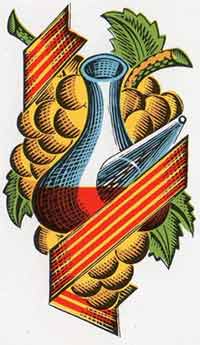
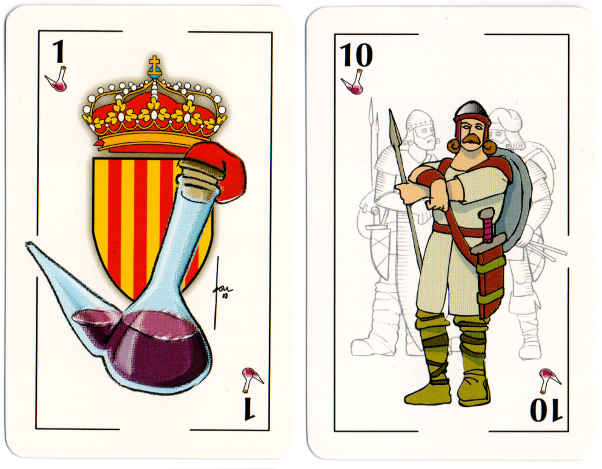
Non-Standard Catalan playing cards
With a distinct history stretching back to the early middle ages, many Catalans think of themselves as a separate nation from the rest of Spain. During the last hundred years or so several ‘Catalan’ decks of playing cards were produced celebrating this independent national identity. Invariably these are Spanish-suited but with non-standard suit symbols associated with Catalan culture. More recently these have been tending towards a re-affirmation of Catalan people’s desire for independence (mainly the separatist Catalan Republican Left). A selection is shown below:
‘Visca Catalunya’ - 1935
‘Visca Catalunya’ playing cards, originally titled ‘Visca La Sardana’, designed by Lluís Vidal Molné (1907-1970) in 1935. Molné was particularly noted for his illustration work and these playing cards are inspired by traditional rural imagery.
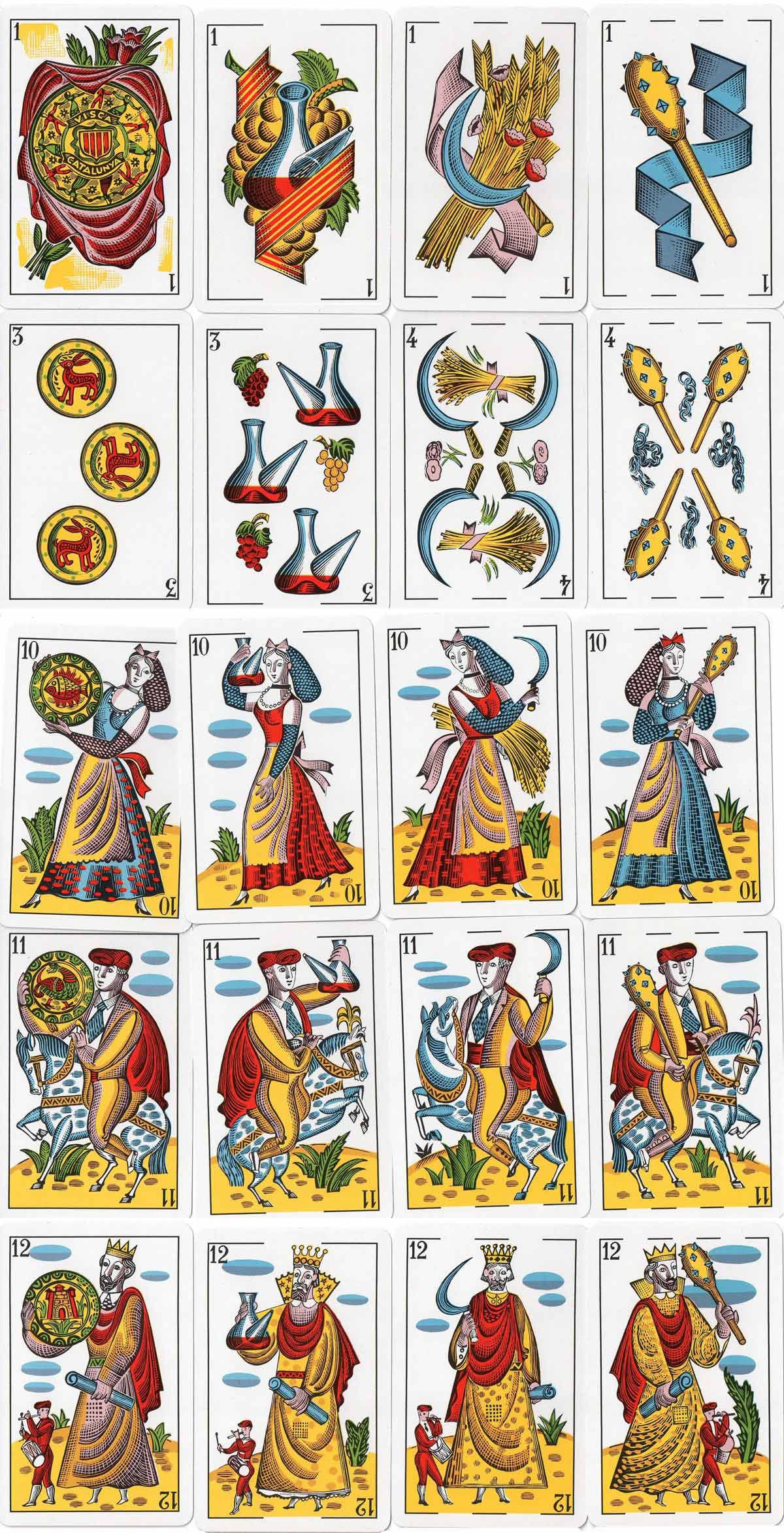
Above: ‘Visca Catalunya’ playing cards designed by Molné and first published by Heraclio Fournier in 1935. The cards are in the style of Spanish-suited cards but with non-standard symbols replacing the conventional coins, cups, swords and clubs.
‘Baraja Catalana’
In ‘Baraja Catalana’ the four suit symbols are representative of the regional culture: barretinas (woolly hats or berets), castellers (towers), roses (Saint George) and mushrooms. Building human towers - “castells” - is a Catalan tradition originating in the 18th century which can be seen performed at local carnivals. Mushrooms are an important part in Catalan cuisine. The court cards show historical persons or attributes of the four suit symbols. The designs are slightly unusual in that there are no ‘pintas’, or border breaks, and no corner pips. Instead there are miniature outline maps of Catalunya in the corners.
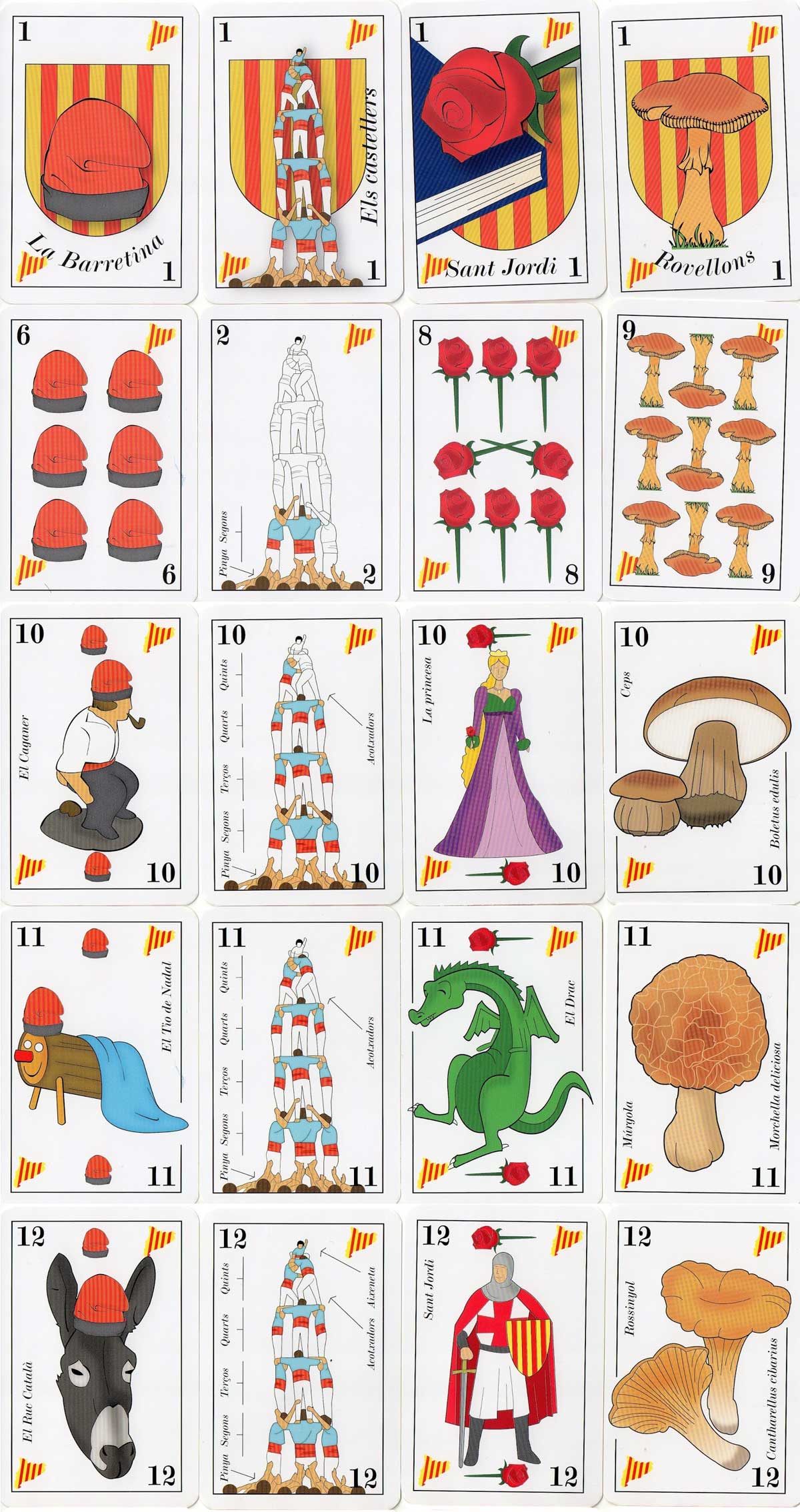
Above: ‘Baraja Catalana’ playing cards published by Varitemas (Mas-Reynals Naipes). 48 cards + 2 Jokers. The reverse shows the Catalan flag.
‘Cartes Catalanes’ - 2006
Inspired by Catalan history and folk imagery, with court cards depicting historical figures and legendary heroes in a medieval style, this deck seeks to bring Catalan culture back to life. The suit signs are based on the Spanish-suited system but with non-standard symbols.
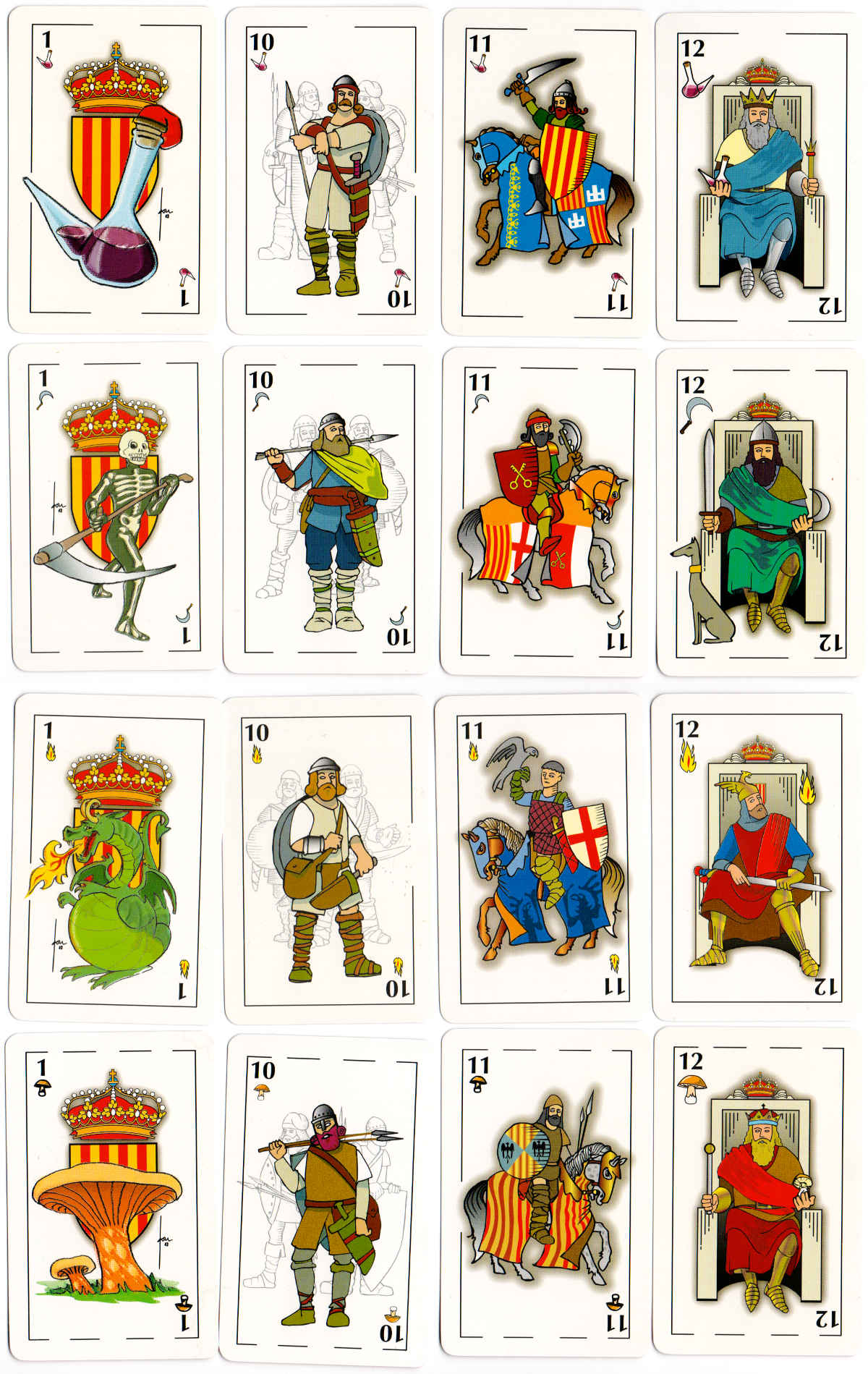
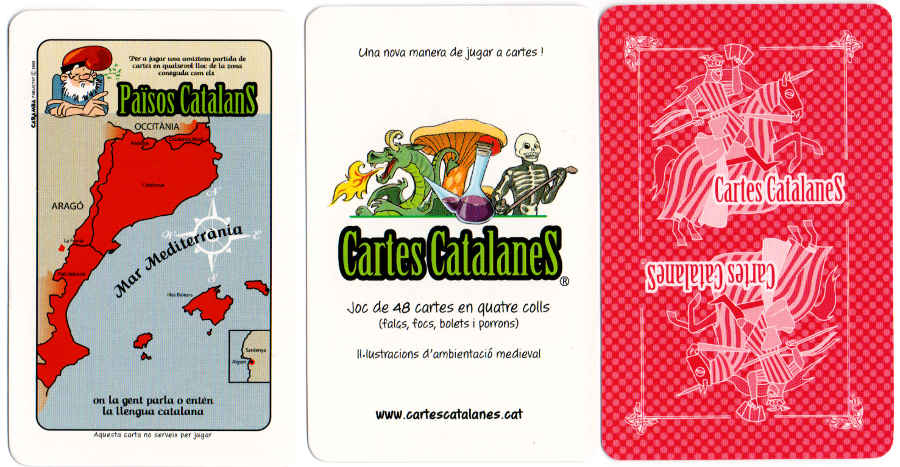
Above: ‘Cartes Catalanes’ designed by Jou Ramírez, published by Caramba Publicitat and printed by Naipes Comas (NEGSA), 2006 and many editions after that. 52 cards + 2 Jokers + title card + 4 explanatory cards in box. All the texts are in the Catalan language.
See also: La Baralla Catalana→

By Simon Wintle
Member since February 01, 1996
I am the founder of The World of Playing Cards (est. 1996), a website dedicated to the history, artistry and cultural significance of playing cards and tarot. Over the years I have researched various areas of the subject, acquired and traded collections and contributed as a committee member of the IPCS and graphics editor of The Playing-Card journal. Having lived in Chile, England, Wales, and now Spain, these experiences have shaped my work and passion for playing cards. Amongst my achievements is producing a limited-edition replica of a 17th-century English pack using woodblocks and stencils—a labour of love. Today, the World of Playing Cards is a global collaborative project, with my son Adam serving as the technical driving force behind its development. His innovative efforts have helped shape the site into the thriving hub it is today. You are warmly invited to become a contributor and share your enthusiasm.
Related Articles

Pierre Varangot
Tracing the origins, legality and legacy of Pierre Varangot’s San Sebastián deck.

Archaic Spanish-suited pattern from Bayonne
Archaic Franco-Spanish pattern from Bayonne by a manufacturer with the initals M.V.

Tarot de las Coscojas
Historical playing card design, tarot symbolism and an almost psychedelic medieval surrealism.

Tarot de Valverde de la Vera
A series of 24 surrealist engravings by Mexican artist Claudio Favier in which archetypal Tarot alle...

Baraja de Juan Martín Zamorano
Deck inspired by El Pendón de los Zamorano, a military pennant dating from 1501, published by Priego...

Heráldica Castanyer No. 16
Strange variant of international pattern cards for poker or bridge.

Fantasy Spanish-suited deck
Fantasy Spanish-suited deck by Bertschinger y Codina, Barcelona.

Bertschinger y Codina - Cartes Françaises
French ‘Paris’ pattern made by Bertschinger y Codina, Barcelona, c.1850.

Braulio Fournier
Baraja Nº 1 produced by Braulio Fournier, Burgos, c.1868.

Pirritx eta Porrotx
Happy Families card game from the Spanish Basque Country.

Naipe Vizcaino
‘Naipe Vizcaino’ designed by Javier Urkiri and published by Industrias Gráficas Castuera and the Caj...

Baraja Turística del País Vasco
Basque poker deck of 55 cards published by Fournier with scenic views of the Basque Country.

Catalan pattern by B.P Grimaud
Standard Spanish Catalan pattern deck made in Paris by B.P Grimaud.

Baraja Vasca
Spanish Basque Country deck with original drawings by María Isabel Ibañez de Sendadiano.

Baraja Cultura Española
ASESCOIN pack for 2022 designed by M.A. Corella featuring famous Spaniards and notable buildings.

Laurenzo Propagine
Spanish-suited cards made in Italy by Laurenzo Propagine.
Most Popular
Our top articles from the past 28 days

